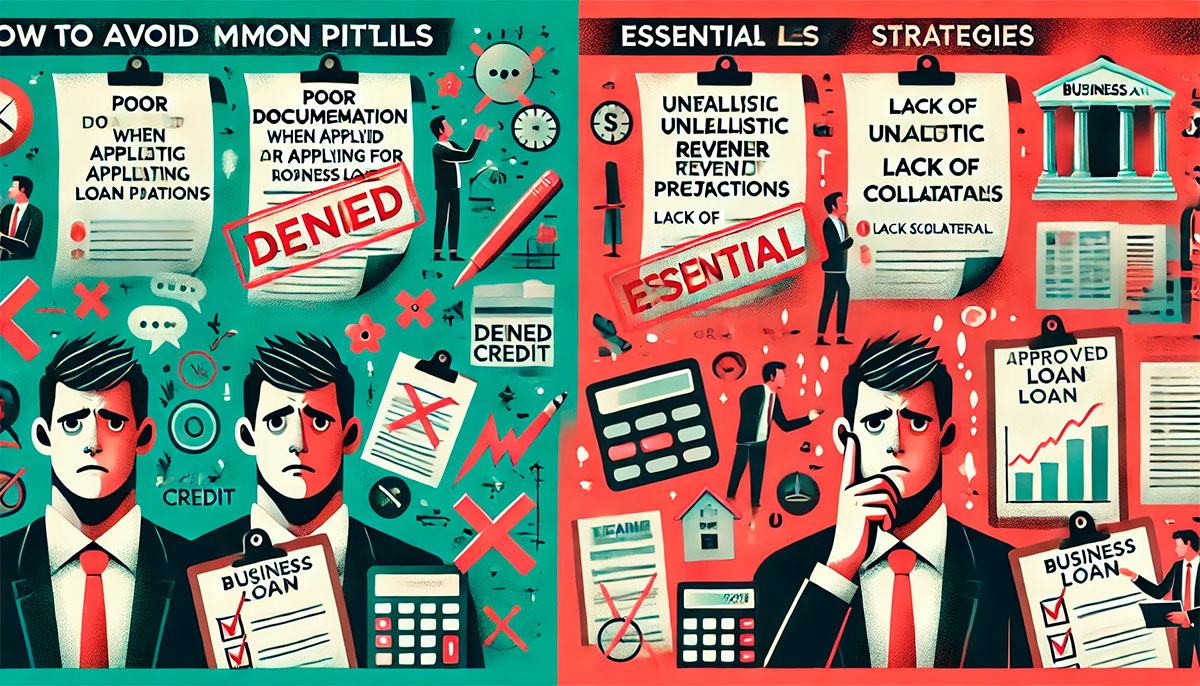
How to Avoid Common Pitfalls When Applying for a Business Loan
Applying for a business loan can be a critical step in expanding operations, managing cash flow, or investing in new opportunities. However, the loan application process is fraught with potential pitfalls that can lead to rejected applications, unfavorable terms, or long-term financial struggles. To ensure success and secure the best possible loan terms, it’s important to be aware of these common mistakes and how to avoid them. This guide will walk you through key pitfalls and offer strategies for navigating the business loan process with confidence.
1. Lack of Preparation
Failing to Organize Financial Documents
One of the most common mistakes business owners make is failing to have their financial documents in order before applying for a loan. Lenders require a thorough examination of your financial health, and incomplete or disorganized financial records can delay the process or even lead to a rejection. Essential documents include tax returns, profit and loss statements, balance sheets, and cash flow statements.
How to Avoid: Before applying for a loan, gather all necessary documents and ensure they are accurate and up-to-date. It’s a good idea to consult with an accountant to make sure everything is in order and meets lender expectations. Having well-organized financial records will help streamline the application process and demonstrate your business’s financial stability.
Underestimating the Importance of a Business Plan
A well-prepared business plan is not just a formality—it’s a key document that lenders review to assess the potential success of your business and its ability to repay the loan. Many applicants underestimate how crucial this plan is to securing financing. A poorly written or incomplete business plan can raise doubts in the lender’s mind, leading to rejection.
How to Avoid: Develop a detailed, professional business plan that outlines your business goals, revenue projections, market analysis, and strategies for growth. Make sure your plan includes how the loan will be used and how you intend to repay it. The more comprehensive and realistic your business plan, the more likely lenders will view your application favorably.
2. Applying for the Wrong Type of Loan
Not Understanding Different Loan Products
Not all loans are created equal. Applying for the wrong type of loan can result in a denial or, worse, saddling your business with unfavorable terms. For instance, short-term loans might be better suited for covering temporary cash flow gaps, while long-term loans are more appropriate for purchasing real estate or equipment. Failing to match the loan type to your business needs can be a costly mistake.
How to Avoid: Research the different types of business loans available, such as SBA loans, term loans, lines of credit, and equipment financing. Understand what each loan type is best suited for and apply for the one that aligns with your business’s needs. If you’re unsure, consult with a financial advisor or lender to find the best option.
Borrowing More (or Less) Than You Need
Determining the right loan amount can be tricky. Borrowing too much can lead to higher monthly payments and increased interest costs, while borrowing too little might leave your business without sufficient capital to achieve its goals. Some businesses take out loans without fully calculating the amount they need, leading to problems down the road.
How to Avoid: Carefully assess your business’s financial situation and calculate the exact amount of capital you need. Take into consideration both immediate and future needs, but avoid overestimating. Borrow enough to cover your costs without overextending your business financially. A solid financial plan will help you determine the right loan amount.
3. Ignoring Your Credit Score
Not Monitoring Personal and Business Credit
Credit scores play a significant role in loan approval, and many business owners neglect to check their credit before applying. Both personal and business credit scores are evaluated during the loan application process. A low credit score can lead to higher interest rates or even loan rejection.
How to Avoid: Regularly monitor both your personal and business credit scores before applying for a loan. If you discover any errors, disputes, or unresolved issues, address them immediately. Improving your credit score—by paying down debt, making timely payments, and reducing credit utilization—can increase your chances of securing better loan terms.

Failing to Build Business Credit
Newer businesses often rely on the owner’s personal credit score, but as your business grows, it’s important to establish a separate business credit profile. Relying solely on personal credit for business loans can limit your financing options and expose you to personal financial risks.
How to Avoid: Take steps to build your business credit by opening business bank accounts, applying for a business credit card, and ensuring that your suppliers report your payments to credit bureaus. A strong business credit profile will make it easier to secure financing on favorable terms and reduce the need for personal guarantees.
4. Overlooking Loan Terms and Conditions
Focusing Solely on Interest Rates
While interest rates are an important factor in choosing a loan, focusing exclusively on rates can cause you to overlook other key loan terms. Fees, penalties, and repayment schedules can significantly affect the total cost of the loan. Many business owners fail to consider these factors, leading to unexpected financial strain.
How to Avoid: Look beyond interest rates and carefully review the loan’s terms and conditions. Pay attention to prepayment penalties, late payment fees, and the overall length of the loan. Ask the lender for a breakdown of all associated costs and make sure you fully understand the total financial commitment before signing.
Overlooking Flexibility in Repayment
Some loans come with rigid repayment schedules, which can be challenging if your business experiences fluctuations in cash flow. Failing to consider the flexibility of the loan’s repayment terms can lead to problems if your business faces a tough month or an unexpected expense.
How to Avoid: Choose a loan that offers repayment terms that align with your business’s revenue patterns. Ask lenders if they offer flexibility, such as deferred payments or interest-only payments during slower periods. The more adaptable the repayment schedule, the easier it will be to manage your cash flow.
5. Mismanaging Loan Proceeds
Not Allocating Funds Appropriately
Once you’ve secured the loan, it’s vital to use the funds wisely. Some businesses fail to allocate the loan proceeds appropriately, spending on nonessential items or failing to track where the money is going. This mismanagement can lead to cash flow issues and difficulty repaying the loan.
How to Avoid: Create a detailed plan for how the loan will be used and stick to it. Track all expenditures and ensure that the funds are directed toward the purposes outlined in your loan application. Maintaining strict control over your finances will help you avoid unnecessary spending and ensure that the loan is working to grow your business.
Neglecting Financial Discipline Post-Loan
Securing a loan can sometimes create a false sense of financial security. After receiving the funds, businesses may relax their financial discipline, assuming that the loan will cover any gaps. However, failing to maintain sound financial practices can quickly lead to trouble, including difficulties in making loan payments.
How to Avoid: Continue practicing financial discipline even after receiving the loan. Maintain a detailed budget, monitor cash flow, and adjust your spending as necessary to ensure that your business remains on solid financial footing. Treat the loan as a tool for growth, not as a lifeline.
Conclusion
Applying for a business loan is a significant financial decision that requires careful planning and attention to detail. By avoiding common pitfalls—such as failing to prepare adequately, misunderstanding loan products, ignoring your credit score, and mismanaging loan proceeds—you can improve your chances of securing the best loan terms and ensuring your business’s long-term success. With the right preparation and financial discipline, a business loan can provide the capital needed to take your business to the next level.
You May Also Like

How to Prepare Financial Statements for a Successful Business Loan Application
September 29, 2024
How Business Loan Terms Can Shape Your Growth Strategy
December 11, 2024
